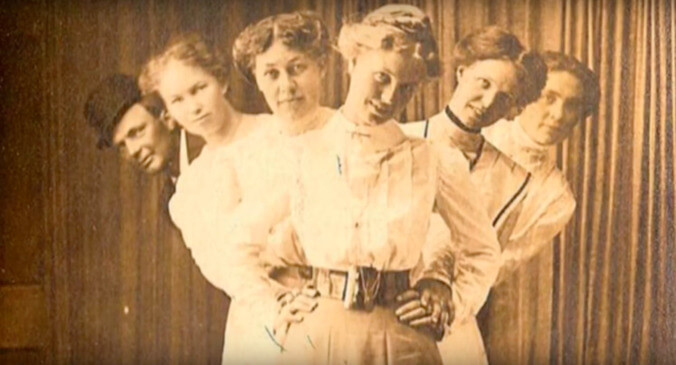Meet the female shoplifting gang who ruled London’s West End for a century

We explore some of Wikipedia’s oddities in our 6,033,951-week series, Wiki Wormhole.
This week’s entry: Forty Elephants
What it’s about: Move over, mafia! From the 1870s (and possibly earlier) through to the 1950s, an all-female crime syndicate ruled London’s black market, robbing from high-end stores and their wealthy patrons, and enforcing their rules on smaller gangs and petty criminals. Also known as the Forty Thieves, the gang operated out of London’s Elephant And Castle district, hence the name.
Biggest controversy: The 19th-century ladies of the gang were able to turn Victorian social mores to their advantage. The same outfits designed to conceal a scandalous glimpse of bare ankle were also useful for concealing fenced goods. It was considered shocking and indecent to search a lady, especially in the high-end stores where the Elephants operated, and unthinkable to interrupt a woman in a changing room. They also flouted the era’s social mores in another way: Members of the gang earned enough money to support their husbands, who were either “idle men who lounged at home, [or] inmates of the British prison system.”
Strangest fact: In the 1920s, the gang became flappers. When the press started breathlessly reporting on the “bright young things”—London’s wealthy socialites of the Roaring ’20s—the Elephants got in on the act, and the previously stealthy gang began throwing lavish parties and throwing money around in nightclubs and fancy restaurants. Raising their profile didn’t seem to put a crimp on the gang’s activities, as the interwar period was the gang’s heyday, and they expanded operations across the whole country.
Thing we were happiest to learn: The gang held their own against the men. Besides being able to enforce authority over their turf (any one else caught stealing in London’s West End had to give the Elephants a cut), they were, “able to meet equal numbers of men in battle.” Male criminals admired the gang, “for their organization and expertise.” The Elephants seem to be a well-disciplined operation. For example, they didn’t wear clothes they stole, and the stores they sold them to removed the tags, made small alterations, and sold them as knockoffs, despite being the real thing. They kept fake books good enough to (at least in one instance) convince the authorities their income was legitimate. (Even when they were caught, sentences for women were light, so gang members often served one to three years and went right back to work).
Thing we were unhappiest to learn: As befitting a secretive criminal organization, we don’t have a ton of information about the Elephants. Although they definitely existed as far back as 1873, no one’s really sure when or how the gang came into being, and there’s speculation they may date to the late 1700s. Wikipedia also gives no information on why the gang disbanded after the ’50s, although we suspect they got nicked by the bobbies, the lot of ’em.
Best link to elsewhere on Wikipedia: One article of clothing useful for concealing stolen goods was the cummerbund. Now only used in extremely formal settings, the cummerbund was fairly commonplace in 19th-century London. It originated in ancient Persia as, essentially, a fanny pack, intended for carrying small items before the advent of pockets. It spread to India, where British colonial forces saw Indian regiments wearing it as part of their uniform and adopted the garment themselves. It caught on in Britain as an alternative to the waistcoat, fortunately for those who wanted a place to hide all the stuff they just stole while still looking stylish.
Further Down the Wormhole: Another article of clothing advantageous for hiding contraband was the skirt. While traditionally a women’s garment in England (and the U.S.), skirts are worn by men worldwide, from the Scottish kilt, to the Japanese hakama, to the fustanella in Albania and Greece. One of Greece’s most enduring inventions is the Olympics, and if that seems like an awkward transition, it’s only because, with the 2020 Olympics postponed and the major sports on hold, Wiki Wormhole is committed to bringing you the thrill of victory and agony of defeat you’ve been missing. Next week we’ll be looking at what must be the biggest single-event debacle in Olympic history, the comedy of errors that was the 1904 Men’s Marathon.